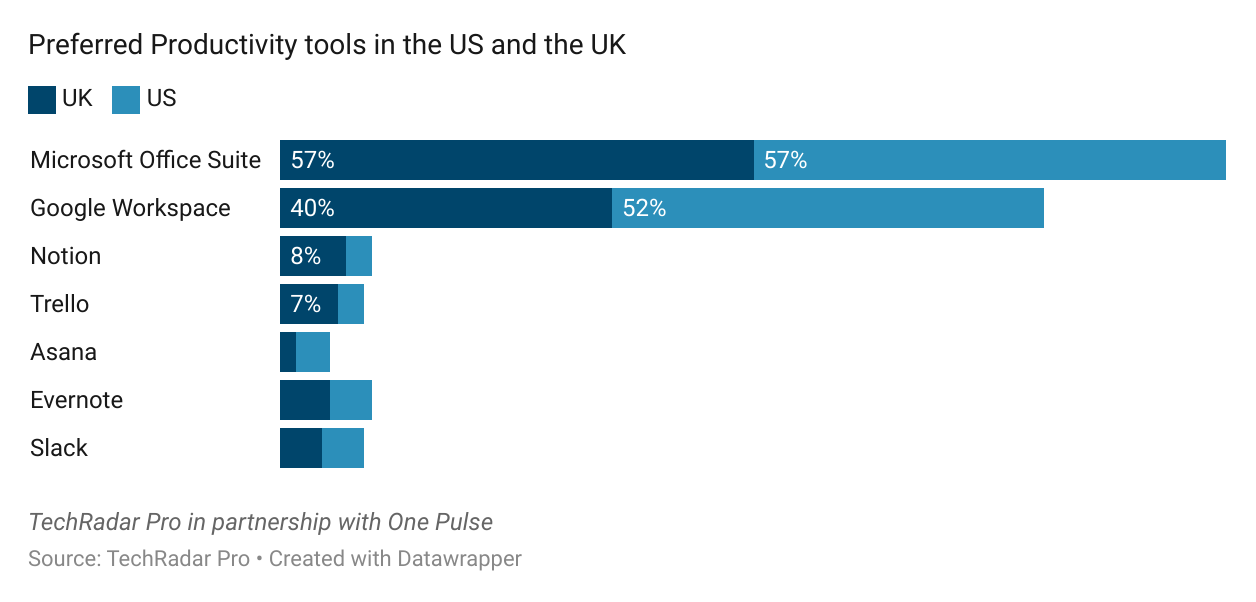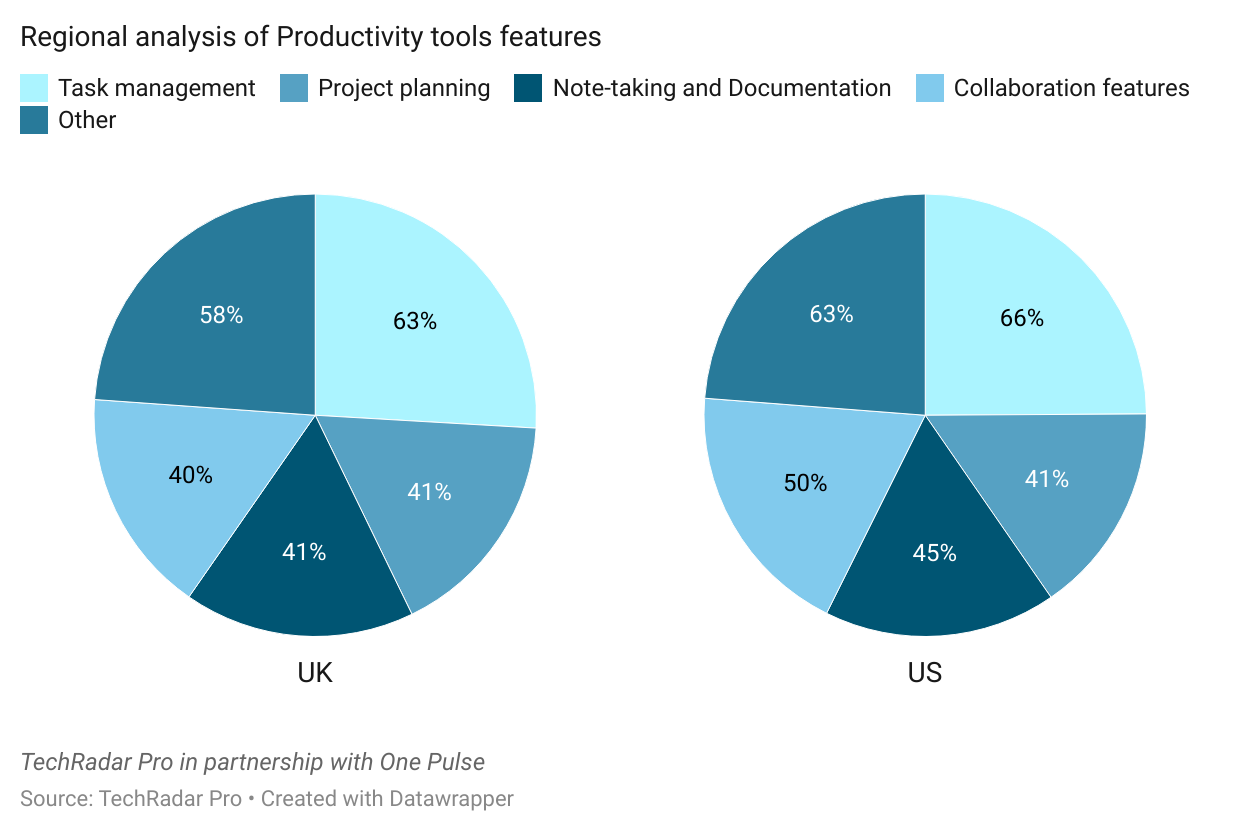Exclusive — we find out what the world's top productivity tools are, and exactly why you like them so much
Are you one of the many who use these productivity tools?

Sign up for breaking news, reviews, opinion, top tech deals, and more.
You are now subscribed
Your newsletter sign-up was successful
In the era of hybrid work and the evolving landscape of flexible lifestyles, the choice of the best productivity tools plays an important role in shaping the efficiency and workflow of individuals.
To take a closer look at this shift, TechRadar Pro partnered with One Pulse for a survey aimed at uncovering the most favored productivity tools among professionals in the UK and the US.
As the boundaries between work and personal life blur, understanding the preferences of the workforce is more than an analysis; it is also a glimpse into the digital preferences of consumers, who are also employees.

Among the 200 respondents surveyed, Microsoft Office Suite emerges as the top choice for productivity tools, with a 57% preference in both the UK and the US. This uniformity suggests a global recognition of Microsoft's integrated solutions, valued for their broad range of applications within a single ecosystem.
While Microsoft Office Suite is the top choice for a majority in both countries, the higher inclination towards Google Workspace in the US suggests a pronounced acceptance of cloud-based collaboration features. This inclination aligns with the broader trend in the US workplace culture, where an emphasis on real-time, online collaboration is more pronounced compared to the UK. This trend is reflected in some of the responses we received in the survey. When asked if there are any more features respondents would like to see in these tools, one of the response suggested to integrate communication features with task management.
"It would be nice to have a system you can use for both communication but also for sharing and creating documents through the same program instead of using different systems."
Lesser-known or more specialized apps such as Notion and Trello were less favorable amongst respondents. Their lower favorability might stem from a lack of extensive features compared to more popular suites like Microsoft Office and Google Workspace.
The landscape suggests an industry where users rely on robust, feature-rich platforms that facilitate a range of tasks from document creation to email management. Despite the plethora of specialized tools available, it is safe to say that functionality and familiarity are paramount when selecting productivity software.
Sign up to the TechRadar Pro newsletter to get all the top news, opinion, features and guidance your business needs to succeed!
Task management takes the lead as the most important feature

We also wanted to find out what consumers look for when deciding their tool of choice.
In both regions, task management claims the top spot as the most important factor. Nearly two-thirds (63%) of respondents in the UK indicated a keen emphasis on organizational efficiency and clear action items. The 40% importance assigned to online collaboration features suggests a substantial focus on team-oriented work environments. Automation, though less critical, still holds relevance, especially in industries where efficiency enhancement is valued, such as the software sector.
Similarly in the US, task management takes precedence with 66%, reinforcing the strong desire for structured work organization. Collaboration features followed closely with 50%, indicating a pronounced emphasis on teamwork and shared working environments. It is also worth noting that these findings perfectly align with industry trends in the software sector, emphasizing the importance of user-friendly, collaborative, and customizable tools for personal and professional efficiency.

Looking ahead
When asked if there are any specific challenges respondents face in their current workflow due to the productivity tools, the responses received were varied. Respondents in both UK and US express a strong desire for integrated productivity tools, emphasizing the need for streamlined workflows combining communication, document creation, and task management.
I often struggle with managing tasks efficiently and staying organized. It would be helpful to have a tool that integrates task management with a user-friendly interface.
I think my current work setup is fine. The only thing is there are some added features for some programs that you have to pay a premium for and that sucks because my work won't buy.
Concerns about cost and access to advanced features are shared, indicating a universal tension between the desire for sophisticated functionalities and budget constraints.
It is also worth to mention that we noticed some discrepancies among the respondents in both regions. While UK respondents highlight satisfaction with their current tools, US participants express more varied sentiments, including concerns about complexity and usability. The US respondents specifically mention issues related to motivation and proactivity, suggesting a distinct emphasis on user engagement and psychological well-being within the workflow. One respondent suggested to integrate techniques such as Pomodoro method to boost productivity.
The US respondents also showed some interest in open-source productivity features. A customizable, accessible and potentially free software options is what they are looking for.
Overall, the theme of the survey indicates that even though popular productivity tools have diverse set of features, there is definitely some room for development. The analysis touches upon current market gaps and user preferences, which could lead to innovative solutions that resonate with potential consumers.
More from TechRadar Pro
- Also take a look at the best small business apps
- We've also rounded up the best free office software
- Your eyes aren't fooling you - the default font for Microsoft 365 has changed

Udita Choudhary is a Content Sub Editor at TechRadar Pro where she manages several verticals including eSIM, programming and productivity. She also works on the affiliate side, managing the editorial needs of diverse clientele. She has written for publications such as Vogue Business, Marie Claire, and Homes & Gardens.